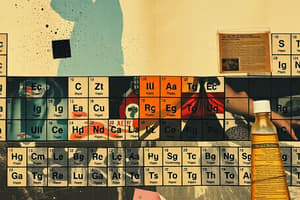Podcast
Questions and Answers
Who is responsible for approving the official names of elements?
Who is responsible for approving the official names of elements?
- The American Chemical Society
- The European Chemical Society
- The International Union of Pure and Applied Chemistry (IUPAC) (correct)
- The Royal Society of Chemistry
Elements with atomic numbers 1-10 are typically named based on their:
Elements with atomic numbers 1-10 are typically named based on their:
- Scientists
- Properties
- Mythological figures
- Latin roots (correct)
What is the basis for naming elements with atomic numbers 11-30?
What is the basis for naming elements with atomic numbers 11-30?
- Scientists
- Properties
- Latin roots with Greek prefixes (correct)
- Mythological figures
How are elements with atomic numbers 104 and above named?
How are elements with atomic numbers 104 and above named?
What is the basis for naming elements like Oxygen and Iodine?
What is the basis for naming elements like Oxygen and Iodine?
Who are some elements named after?
Who are some elements named after?
Flashcards are hidden until you start studying
Study Notes
Element Names
- The International Union of Pure and Applied Chemistry (IUPAC) is responsible for approving the official names of elements.
- Elements are named based on their properties, discovery, or the scientist who discovered them.
- Some elements are named after:
- Mythological figures (e.g., Titanium, Tantalum)
- Places (e.g., Francium, Germanium)
- Properties (e.g., Oxygen, Iodine)
- Scientists (e.g., Curium, Rutherfordium)
- Elements with atomic numbers 1-10 have Latin roots:
- Hydrogen (hydrogenium)
- Helium (helium)
- Lithium (lithium)
- ...and so on
- Elements with atomic numbers 11-30 have Latin roots with Greek prefixes:
- Sodium (natrium)
- Magnesium (magnesium)
- Aluminum (aluminium)
- ...and so on
- Elements with atomic numbers 31-103 have a combination of Latin and Greek roots:
- Germanium (germanium)
- Arsenic (arsenicum)
- Selenium (selenium)
- ...and so on
- Elements with atomic numbers 104 and above have temporary names based on their atomic number:
- Unnilquadium (104)
- Unnilpentium (105)
- ...and so on
Studying That Suits You
Use AI to generate personalized quizzes and flashcards to suit your learning preferences.




